MBA401 Reflective Journal: Personal Leadership Development Plan
VerifiedAdded on 2023/04/22
|15
|2789
|234
Journal and Reflective Writing
AI Summary
This reflective journal delves into a personal assessment of leadership capabilities, drawing upon class experiences, activities, and the results of leadership tests. It examines the trait theory of leadership and talent management theory, incorporating learnings from online resources, feedback sheets, and guest lectures. The journal analyzes the results of the 123test and situational judgment test to identify weaknesses in communication skills, self-confidence, and interpersonal skills. Class activities from Week 5 and Week 8 are discussed, focusing on talent management, leadership development, and the motives behind leadership decisions. The essay concludes by outlining areas for development and strategies to achieve these improvements, aiming to cultivate effective leadership qualities. Desklib provides access to more solved assignments and resources for students.
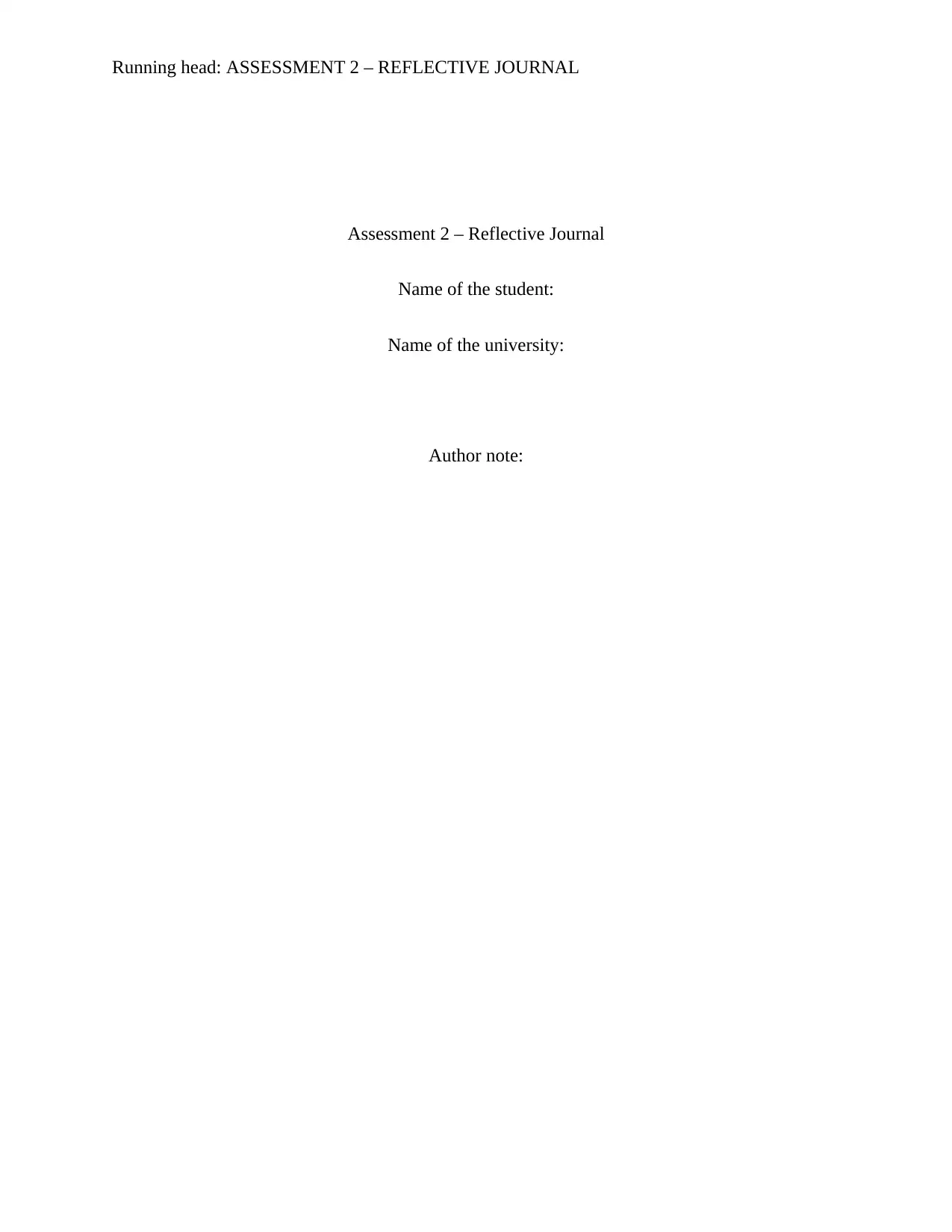
Running head: ASSESSMENT 2 – REFLECTIVE JOURNAL
Assessment 2 – Reflective Journal
Name of the student:
Name of the university:
Author note:
Assessment 2 – Reflective Journal
Name of the student:
Name of the university:
Author note:
Paraphrase This Document
Need a fresh take? Get an instant paraphrase of this document with our AI Paraphraser
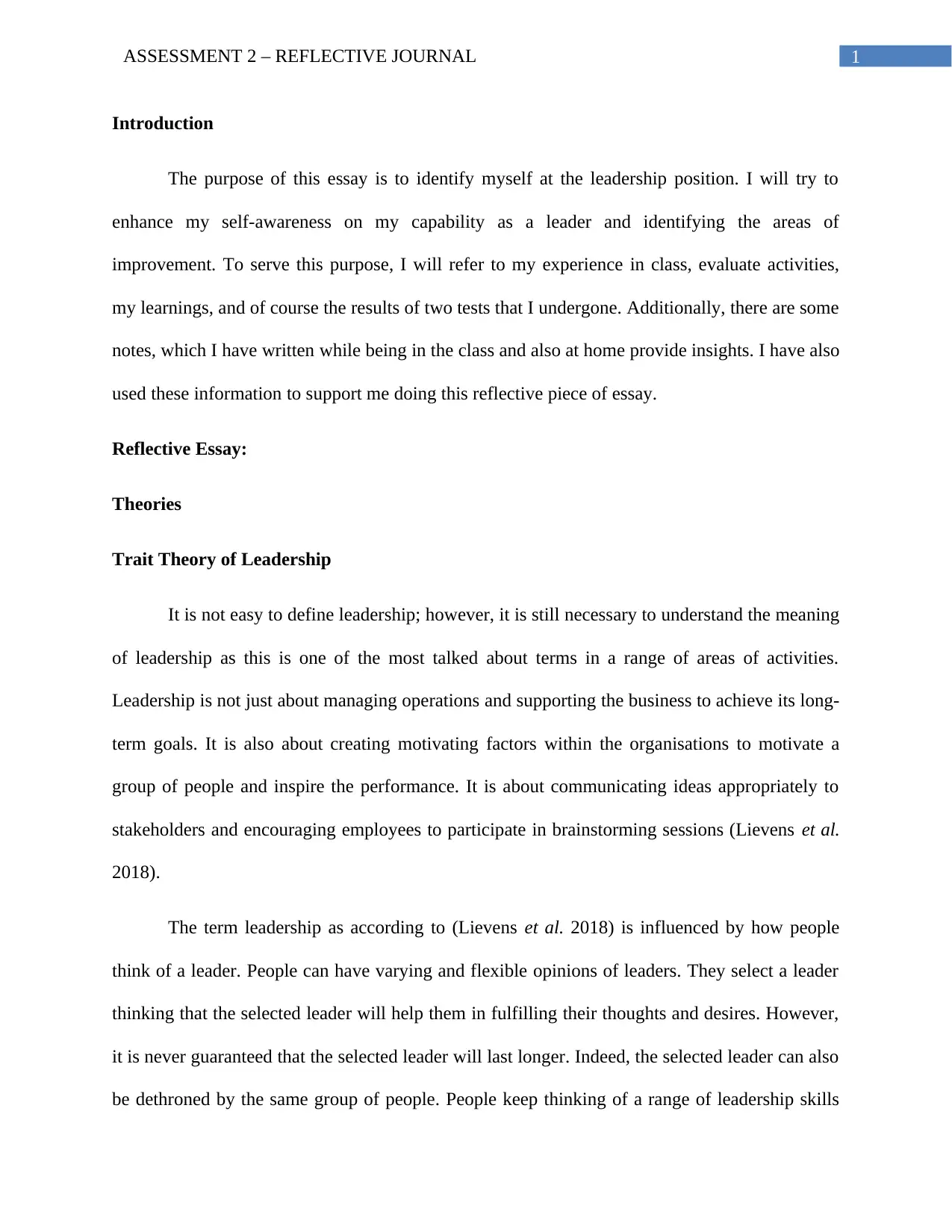
1ASSESSMENT 2 – REFLECTIVE JOURNAL
Introduction
The purpose of this essay is to identify myself at the leadership position. I will try to
enhance my self-awareness on my capability as a leader and identifying the areas of
improvement. To serve this purpose, I will refer to my experience in class, evaluate activities,
my learnings, and of course the results of two tests that I undergone. Additionally, there are some
notes, which I have written while being in the class and also at home provide insights. I have also
used these information to support me doing this reflective piece of essay.
Reflective Essay:
Theories
Trait Theory of Leadership
It is not easy to define leadership; however, it is still necessary to understand the meaning
of leadership as this is one of the most talked about terms in a range of areas of activities.
Leadership is not just about managing operations and supporting the business to achieve its long-
term goals. It is also about creating motivating factors within the organisations to motivate a
group of people and inspire the performance. It is about communicating ideas appropriately to
stakeholders and encouraging employees to participate in brainstorming sessions (Lievens et al.
2018).
The term leadership as according to (Lievens et al. 2018) is influenced by how people
think of a leader. People can have varying and flexible opinions of leaders. They select a leader
thinking that the selected leader will help them in fulfilling their thoughts and desires. However,
it is never guaranteed that the selected leader will last longer. Indeed, the selected leader can also
be dethroned by the same group of people. People keep thinking of a range of leadership skills
Introduction
The purpose of this essay is to identify myself at the leadership position. I will try to
enhance my self-awareness on my capability as a leader and identifying the areas of
improvement. To serve this purpose, I will refer to my experience in class, evaluate activities,
my learnings, and of course the results of two tests that I undergone. Additionally, there are some
notes, which I have written while being in the class and also at home provide insights. I have also
used these information to support me doing this reflective piece of essay.
Reflective Essay:
Theories
Trait Theory of Leadership
It is not easy to define leadership; however, it is still necessary to understand the meaning
of leadership as this is one of the most talked about terms in a range of areas of activities.
Leadership is not just about managing operations and supporting the business to achieve its long-
term goals. It is also about creating motivating factors within the organisations to motivate a
group of people and inspire the performance. It is about communicating ideas appropriately to
stakeholders and encouraging employees to participate in brainstorming sessions (Lievens et al.
2018).
The term leadership as according to (Lievens et al. 2018) is influenced by how people
think of a leader. People can have varying and flexible opinions of leaders. They select a leader
thinking that the selected leader will help them in fulfilling their thoughts and desires. However,
it is never guaranteed that the selected leader will last longer. Indeed, the selected leader can also
be dethroned by the same group of people. People keep thinking of a range of leadership skills
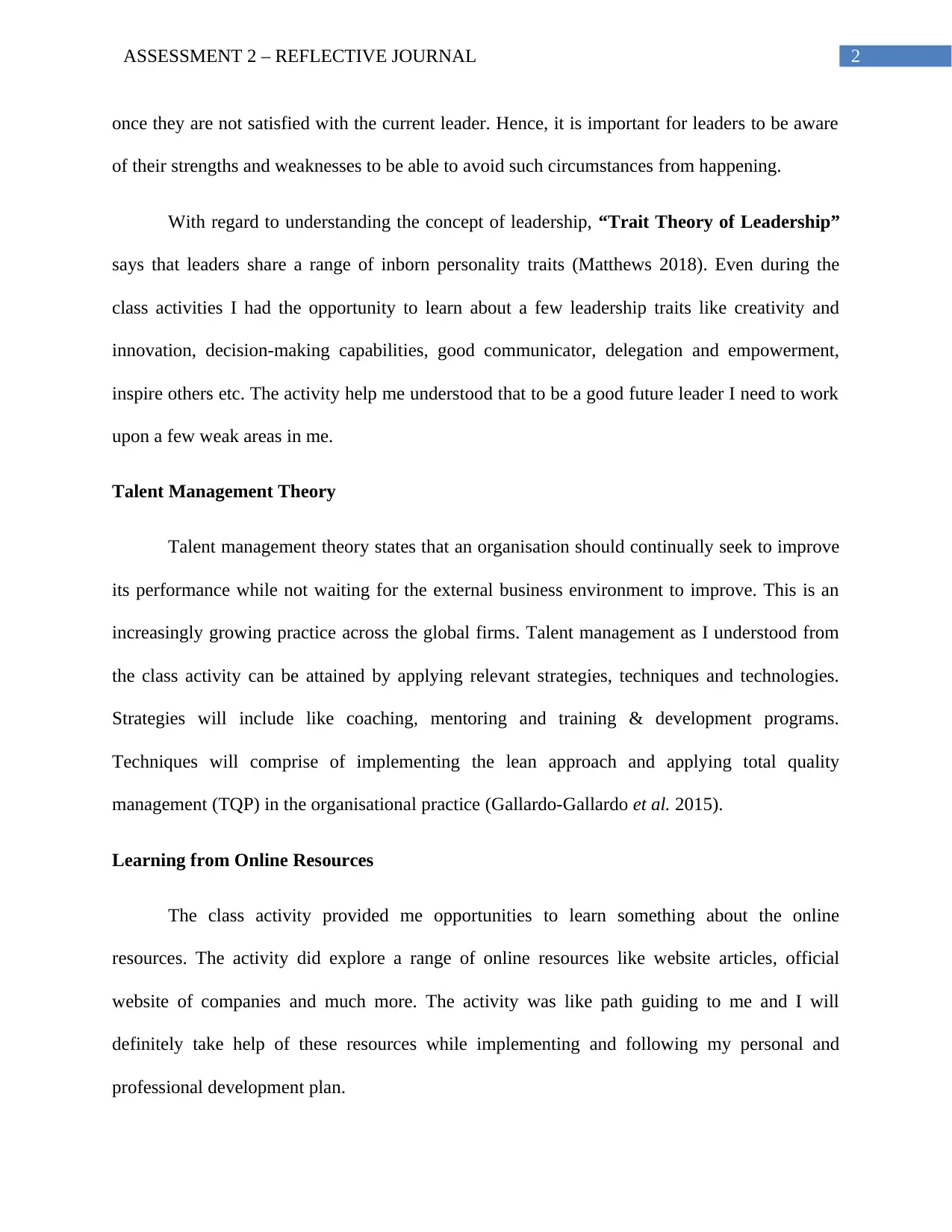
2ASSESSMENT 2 – REFLECTIVE JOURNAL
once they are not satisfied with the current leader. Hence, it is important for leaders to be aware
of their strengths and weaknesses to be able to avoid such circumstances from happening.
With regard to understanding the concept of leadership, “Trait Theory of Leadership”
says that leaders share a range of inborn personality traits (Matthews 2018). Even during the
class activities I had the opportunity to learn about a few leadership traits like creativity and
innovation, decision-making capabilities, good communicator, delegation and empowerment,
inspire others etc. The activity help me understood that to be a good future leader I need to work
upon a few weak areas in me.
Talent Management Theory
Talent management theory states that an organisation should continually seek to improve
its performance while not waiting for the external business environment to improve. This is an
increasingly growing practice across the global firms. Talent management as I understood from
the class activity can be attained by applying relevant strategies, techniques and technologies.
Strategies will include like coaching, mentoring and training & development programs.
Techniques will comprise of implementing the lean approach and applying total quality
management (TQP) in the organisational practice (Gallardo-Gallardo et al. 2015).
Learning from Online Resources
The class activity provided me opportunities to learn something about the online
resources. The activity did explore a range of online resources like website articles, official
website of companies and much more. The activity was like path guiding to me and I will
definitely take help of these resources while implementing and following my personal and
professional development plan.
once they are not satisfied with the current leader. Hence, it is important for leaders to be aware
of their strengths and weaknesses to be able to avoid such circumstances from happening.
With regard to understanding the concept of leadership, “Trait Theory of Leadership”
says that leaders share a range of inborn personality traits (Matthews 2018). Even during the
class activities I had the opportunity to learn about a few leadership traits like creativity and
innovation, decision-making capabilities, good communicator, delegation and empowerment,
inspire others etc. The activity help me understood that to be a good future leader I need to work
upon a few weak areas in me.
Talent Management Theory
Talent management theory states that an organisation should continually seek to improve
its performance while not waiting for the external business environment to improve. This is an
increasingly growing practice across the global firms. Talent management as I understood from
the class activity can be attained by applying relevant strategies, techniques and technologies.
Strategies will include like coaching, mentoring and training & development programs.
Techniques will comprise of implementing the lean approach and applying total quality
management (TQP) in the organisational practice (Gallardo-Gallardo et al. 2015).
Learning from Online Resources
The class activity provided me opportunities to learn something about the online
resources. The activity did explore a range of online resources like website articles, official
website of companies and much more. The activity was like path guiding to me and I will
definitely take help of these resources while implementing and following my personal and
professional development plan.
⊘ This is a preview!⊘
Do you want full access?
Subscribe today to unlock all pages.

Trusted by 1+ million students worldwide
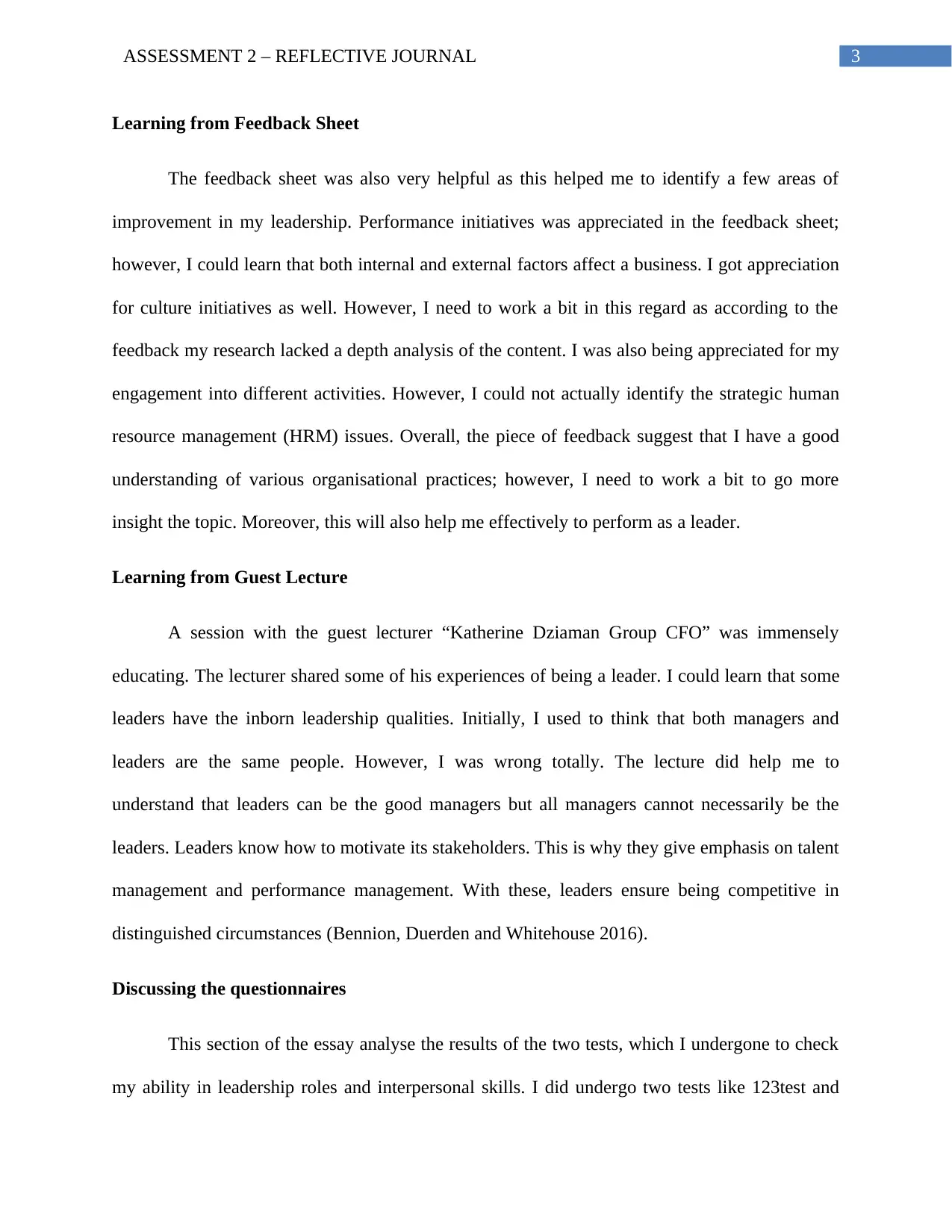
3ASSESSMENT 2 – REFLECTIVE JOURNAL
Learning from Feedback Sheet
The feedback sheet was also very helpful as this helped me to identify a few areas of
improvement in my leadership. Performance initiatives was appreciated in the feedback sheet;
however, I could learn that both internal and external factors affect a business. I got appreciation
for culture initiatives as well. However, I need to work a bit in this regard as according to the
feedback my research lacked a depth analysis of the content. I was also being appreciated for my
engagement into different activities. However, I could not actually identify the strategic human
resource management (HRM) issues. Overall, the piece of feedback suggest that I have a good
understanding of various organisational practices; however, I need to work a bit to go more
insight the topic. Moreover, this will also help me effectively to perform as a leader.
Learning from Guest Lecture
A session with the guest lecturer “Katherine Dziaman Group CFO” was immensely
educating. The lecturer shared some of his experiences of being a leader. I could learn that some
leaders have the inborn leadership qualities. Initially, I used to think that both managers and
leaders are the same people. However, I was wrong totally. The lecture did help me to
understand that leaders can be the good managers but all managers cannot necessarily be the
leaders. Leaders know how to motivate its stakeholders. This is why they give emphasis on talent
management and performance management. With these, leaders ensure being competitive in
distinguished circumstances (Bennion, Duerden and Whitehouse 2016).
Discussing the questionnaires
This section of the essay analyse the results of the two tests, which I undergone to check
my ability in leadership roles and interpersonal skills. I did undergo two tests like 123test and
Learning from Feedback Sheet
The feedback sheet was also very helpful as this helped me to identify a few areas of
improvement in my leadership. Performance initiatives was appreciated in the feedback sheet;
however, I could learn that both internal and external factors affect a business. I got appreciation
for culture initiatives as well. However, I need to work a bit in this regard as according to the
feedback my research lacked a depth analysis of the content. I was also being appreciated for my
engagement into different activities. However, I could not actually identify the strategic human
resource management (HRM) issues. Overall, the piece of feedback suggest that I have a good
understanding of various organisational practices; however, I need to work a bit to go more
insight the topic. Moreover, this will also help me effectively to perform as a leader.
Learning from Guest Lecture
A session with the guest lecturer “Katherine Dziaman Group CFO” was immensely
educating. The lecturer shared some of his experiences of being a leader. I could learn that some
leaders have the inborn leadership qualities. Initially, I used to think that both managers and
leaders are the same people. However, I was wrong totally. The lecture did help me to
understand that leaders can be the good managers but all managers cannot necessarily be the
leaders. Leaders know how to motivate its stakeholders. This is why they give emphasis on talent
management and performance management. With these, leaders ensure being competitive in
distinguished circumstances (Bennion, Duerden and Whitehouse 2016).
Discussing the questionnaires
This section of the essay analyse the results of the two tests, which I undergone to check
my ability in leadership roles and interpersonal skills. I did undergo two tests like 123test and
Paraphrase This Document
Need a fresh take? Get an instant paraphrase of this document with our AI Paraphraser
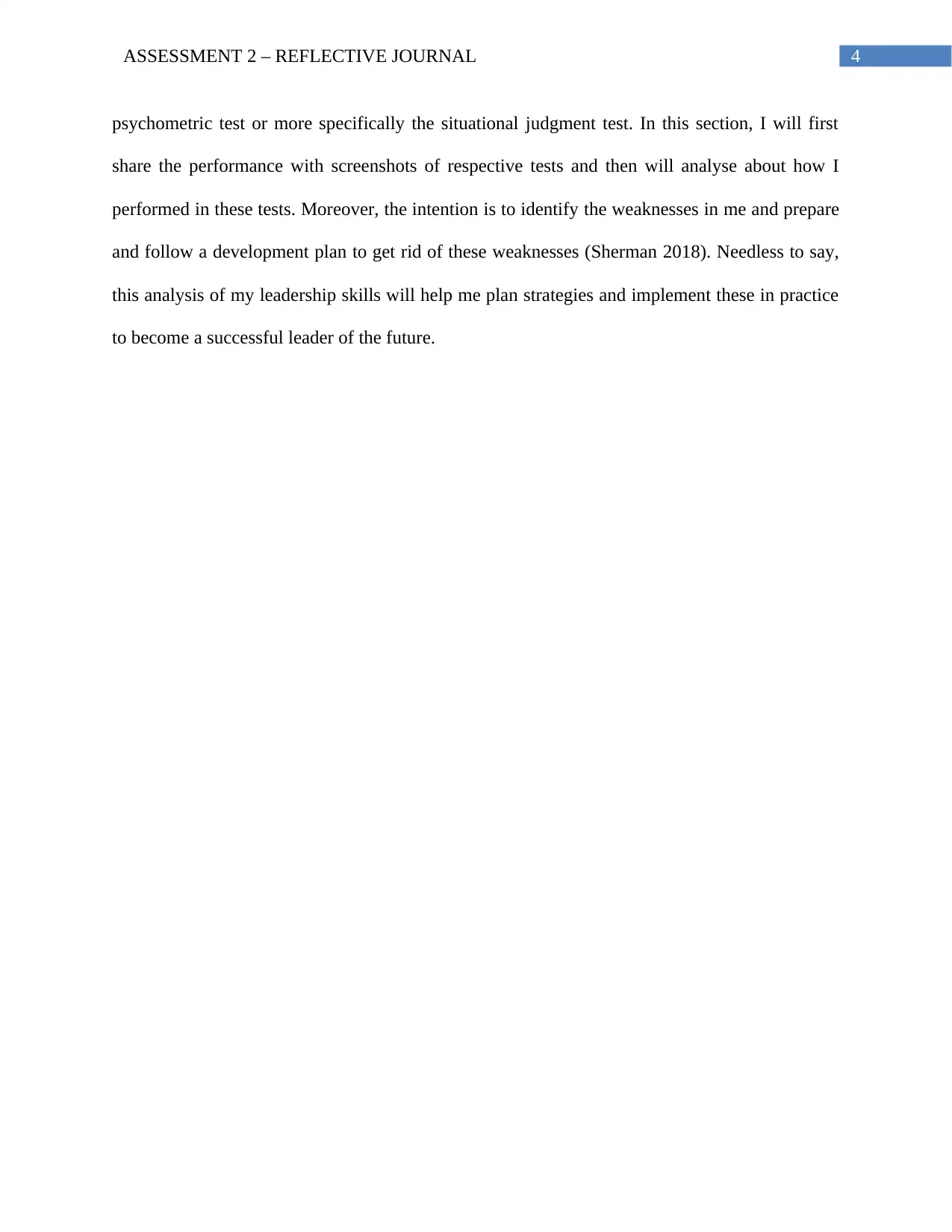
4ASSESSMENT 2 – REFLECTIVE JOURNAL
psychometric test or more specifically the situational judgment test. In this section, I will first
share the performance with screenshots of respective tests and then will analyse about how I
performed in these tests. Moreover, the intention is to identify the weaknesses in me and prepare
and follow a development plan to get rid of these weaknesses (Sherman 2018). Needless to say,
this analysis of my leadership skills will help me plan strategies and implement these in practice
to become a successful leader of the future.
psychometric test or more specifically the situational judgment test. In this section, I will first
share the performance with screenshots of respective tests and then will analyse about how I
performed in these tests. Moreover, the intention is to identify the weaknesses in me and prepare
and follow a development plan to get rid of these weaknesses (Sherman 2018). Needless to say,
this analysis of my leadership skills will help me plan strategies and implement these in practice
to become a successful leader of the future.
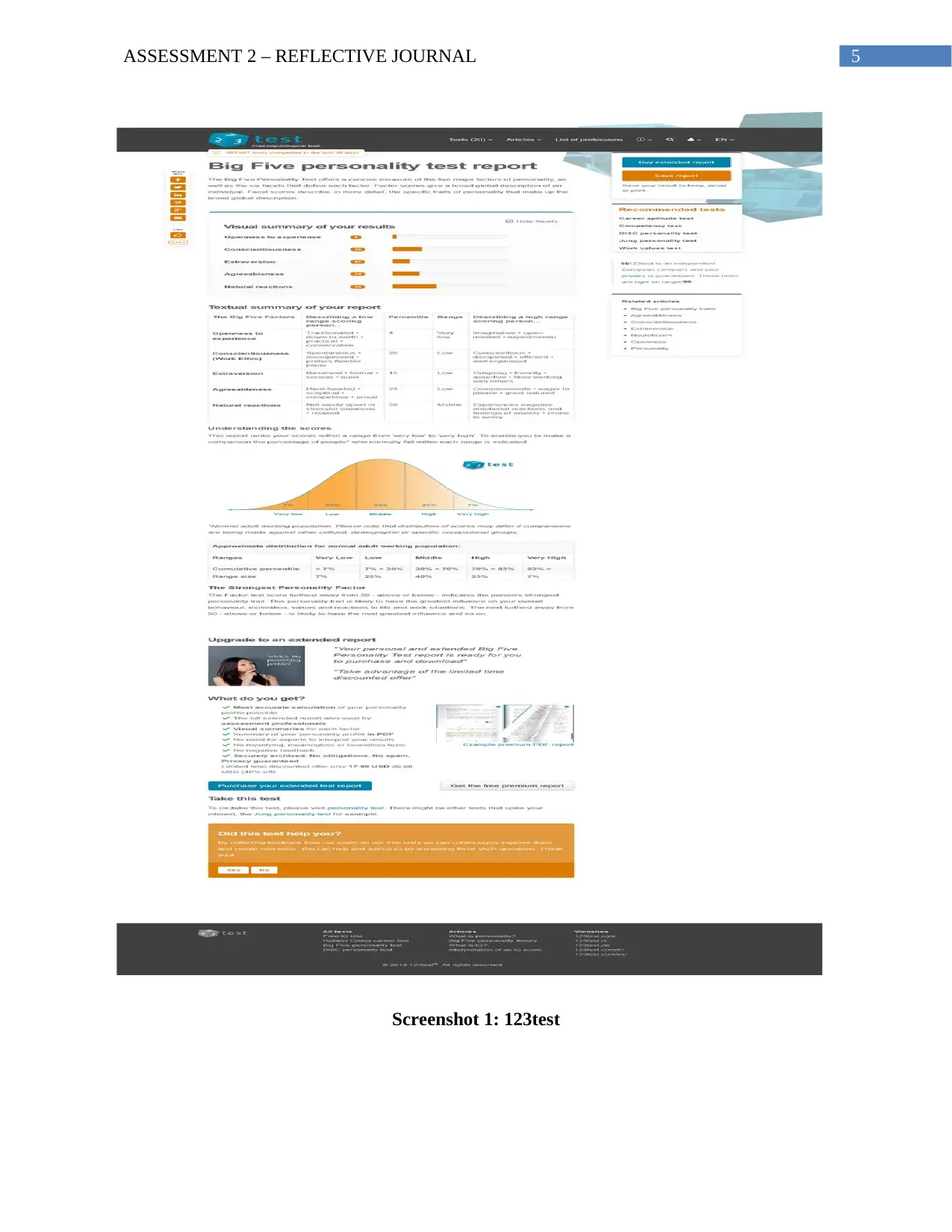
5ASSESSMENT 2 – REFLECTIVE JOURNAL
Screenshot 1: 123test
Screenshot 1: 123test
⊘ This is a preview!⊘
Do you want full access?
Subscribe today to unlock all pages.

Trusted by 1+ million students worldwide
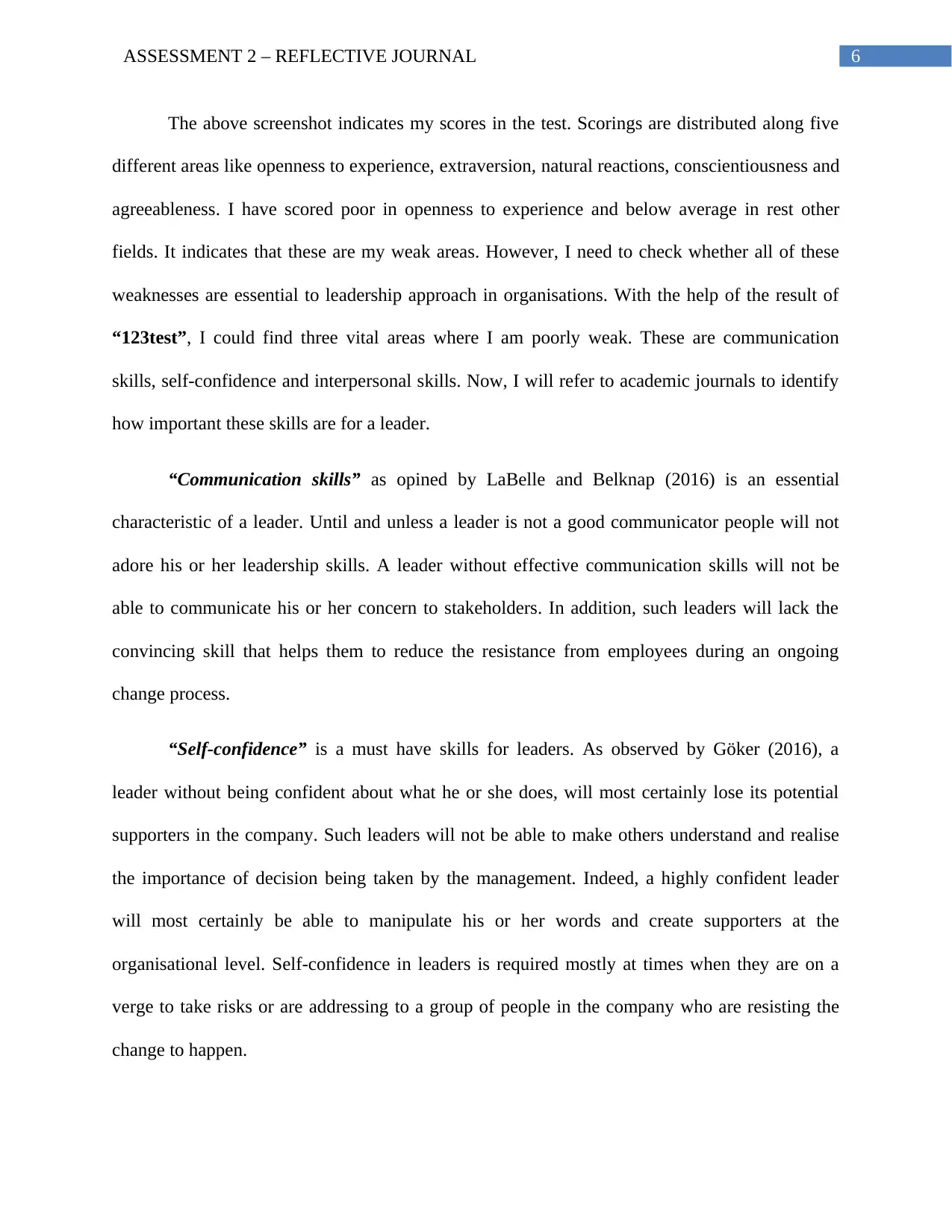
6ASSESSMENT 2 – REFLECTIVE JOURNAL
The above screenshot indicates my scores in the test. Scorings are distributed along five
different areas like openness to experience, extraversion, natural reactions, conscientiousness and
agreeableness. I have scored poor in openness to experience and below average in rest other
fields. It indicates that these are my weak areas. However, I need to check whether all of these
weaknesses are essential to leadership approach in organisations. With the help of the result of
“123test”, I could find three vital areas where I am poorly weak. These are communication
skills, self-confidence and interpersonal skills. Now, I will refer to academic journals to identify
how important these skills are for a leader.
“Communication skills” as opined by LaBelle and Belknap (2016) is an essential
characteristic of a leader. Until and unless a leader is not a good communicator people will not
adore his or her leadership skills. A leader without effective communication skills will not be
able to communicate his or her concern to stakeholders. In addition, such leaders will lack the
convincing skill that helps them to reduce the resistance from employees during an ongoing
change process.
“Self-confidence” is a must have skills for leaders. As observed by Göker (2016), a
leader without being confident about what he or she does, will most certainly lose its potential
supporters in the company. Such leaders will not be able to make others understand and realise
the importance of decision being taken by the management. Indeed, a highly confident leader
will most certainly be able to manipulate his or her words and create supporters at the
organisational level. Self-confidence in leaders is required mostly at times when they are on a
verge to take risks or are addressing to a group of people in the company who are resisting the
change to happen.
The above screenshot indicates my scores in the test. Scorings are distributed along five
different areas like openness to experience, extraversion, natural reactions, conscientiousness and
agreeableness. I have scored poor in openness to experience and below average in rest other
fields. It indicates that these are my weak areas. However, I need to check whether all of these
weaknesses are essential to leadership approach in organisations. With the help of the result of
“123test”, I could find three vital areas where I am poorly weak. These are communication
skills, self-confidence and interpersonal skills. Now, I will refer to academic journals to identify
how important these skills are for a leader.
“Communication skills” as opined by LaBelle and Belknap (2016) is an essential
characteristic of a leader. Until and unless a leader is not a good communicator people will not
adore his or her leadership skills. A leader without effective communication skills will not be
able to communicate his or her concern to stakeholders. In addition, such leaders will lack the
convincing skill that helps them to reduce the resistance from employees during an ongoing
change process.
“Self-confidence” is a must have skills for leaders. As observed by Göker (2016), a
leader without being confident about what he or she does, will most certainly lose its potential
supporters in the company. Such leaders will not be able to make others understand and realise
the importance of decision being taken by the management. Indeed, a highly confident leader
will most certainly be able to manipulate his or her words and create supporters at the
organisational level. Self-confidence in leaders is required mostly at times when they are on a
verge to take risks or are addressing to a group of people in the company who are resisting the
change to happen.
Paraphrase This Document
Need a fresh take? Get an instant paraphrase of this document with our AI Paraphraser
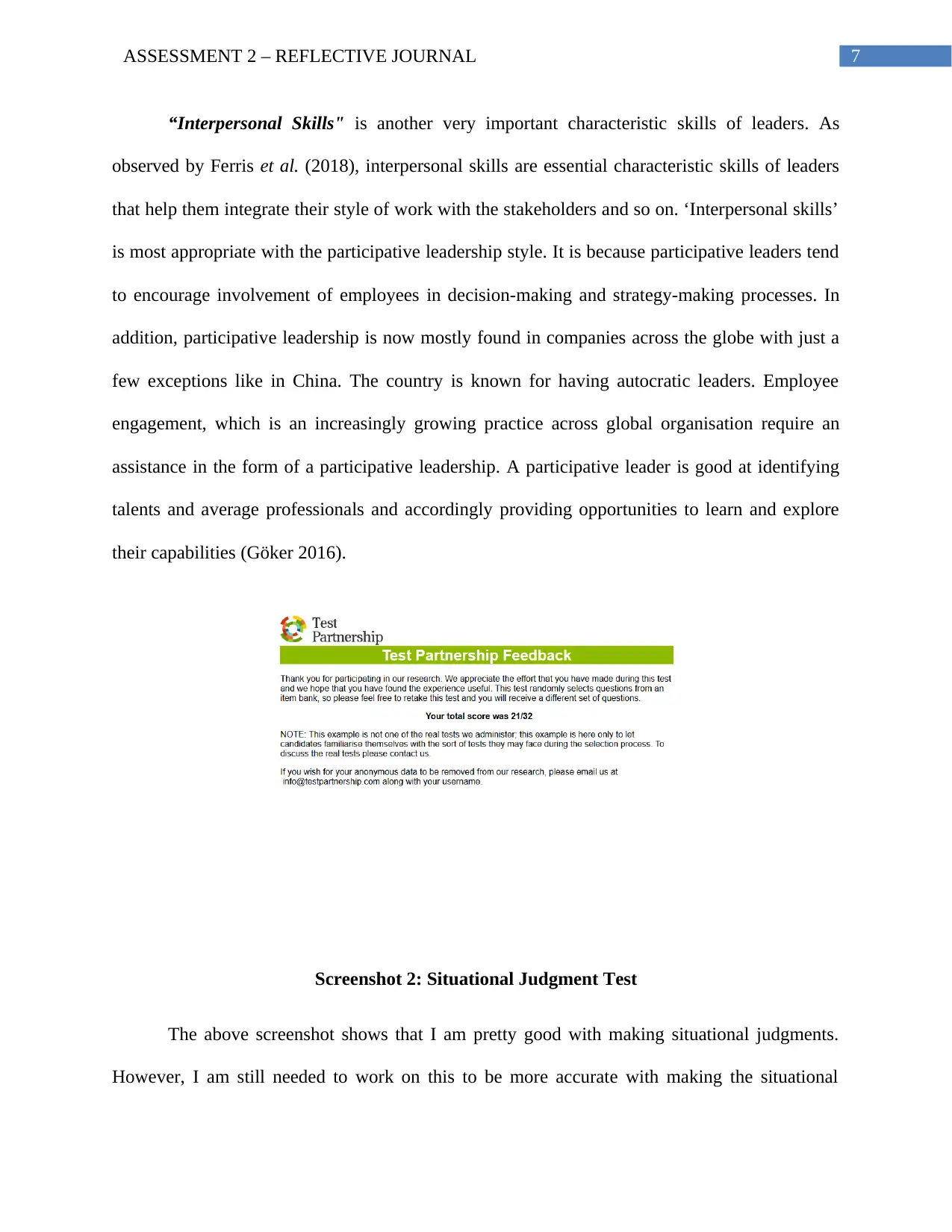
7ASSESSMENT 2 – REFLECTIVE JOURNAL
“Interpersonal Skills" is another very important characteristic skills of leaders. As
observed by Ferris et al. (2018), interpersonal skills are essential characteristic skills of leaders
that help them integrate their style of work with the stakeholders and so on. ‘Interpersonal skills’
is most appropriate with the participative leadership style. It is because participative leaders tend
to encourage involvement of employees in decision-making and strategy-making processes. In
addition, participative leadership is now mostly found in companies across the globe with just a
few exceptions like in China. The country is known for having autocratic leaders. Employee
engagement, which is an increasingly growing practice across global organisation require an
assistance in the form of a participative leadership. A participative leader is good at identifying
talents and average professionals and accordingly providing opportunities to learn and explore
their capabilities (Göker 2016).
Screenshot 2: Situational Judgment Test
The above screenshot shows that I am pretty good with making situational judgments.
However, I am still needed to work on this to be more accurate with making the situational
“Interpersonal Skills" is another very important characteristic skills of leaders. As
observed by Ferris et al. (2018), interpersonal skills are essential characteristic skills of leaders
that help them integrate their style of work with the stakeholders and so on. ‘Interpersonal skills’
is most appropriate with the participative leadership style. It is because participative leaders tend
to encourage involvement of employees in decision-making and strategy-making processes. In
addition, participative leadership is now mostly found in companies across the globe with just a
few exceptions like in China. The country is known for having autocratic leaders. Employee
engagement, which is an increasingly growing practice across global organisation require an
assistance in the form of a participative leadership. A participative leader is good at identifying
talents and average professionals and accordingly providing opportunities to learn and explore
their capabilities (Göker 2016).
Screenshot 2: Situational Judgment Test
The above screenshot shows that I am pretty good with making situational judgments.
However, I am still needed to work on this to be more accurate with making the situational
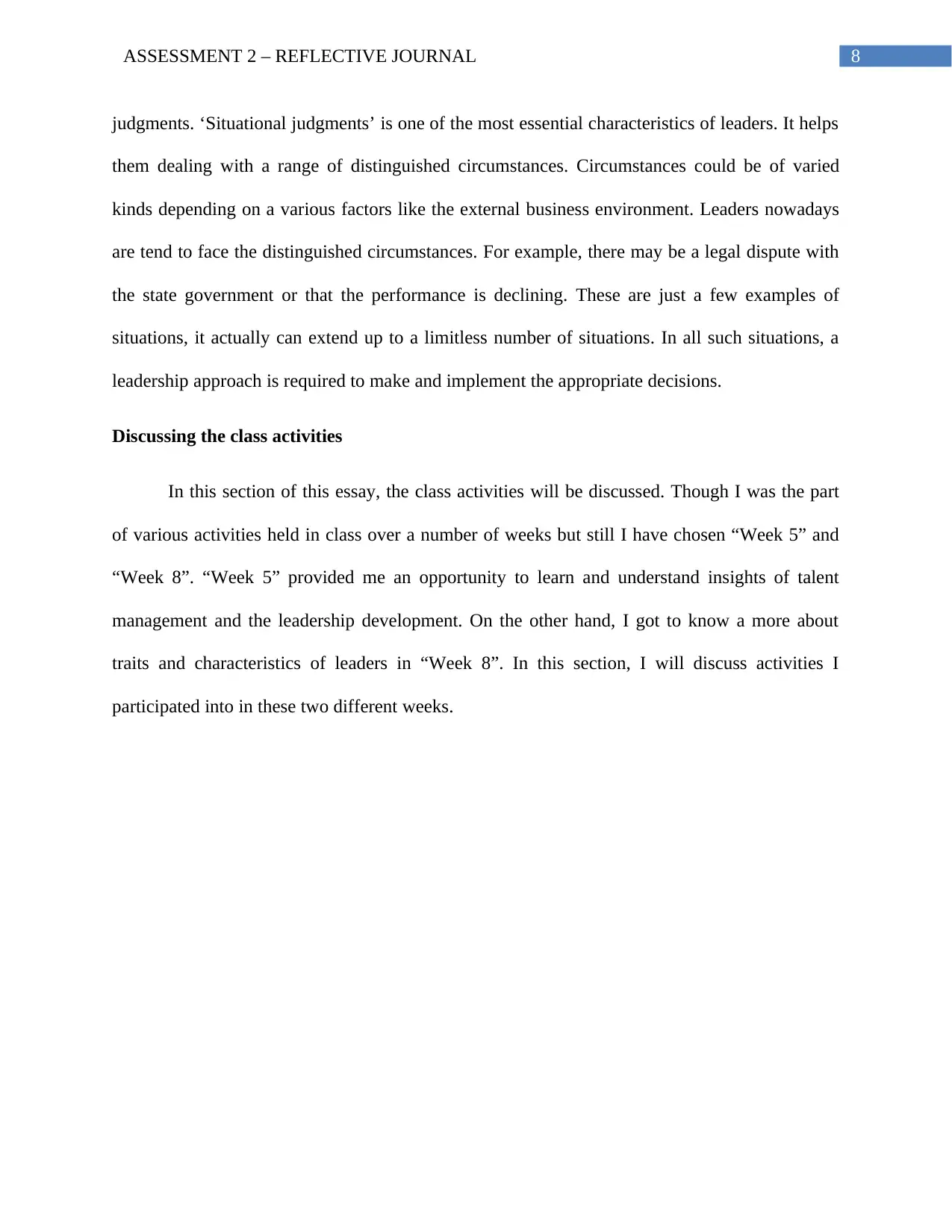
8ASSESSMENT 2 – REFLECTIVE JOURNAL
judgments. ‘Situational judgments’ is one of the most essential characteristics of leaders. It helps
them dealing with a range of distinguished circumstances. Circumstances could be of varied
kinds depending on a various factors like the external business environment. Leaders nowadays
are tend to face the distinguished circumstances. For example, there may be a legal dispute with
the state government or that the performance is declining. These are just a few examples of
situations, it actually can extend up to a limitless number of situations. In all such situations, a
leadership approach is required to make and implement the appropriate decisions.
Discussing the class activities
In this section of this essay, the class activities will be discussed. Though I was the part
of various activities held in class over a number of weeks but still I have chosen “Week 5” and
“Week 8”. “Week 5” provided me an opportunity to learn and understand insights of talent
management and the leadership development. On the other hand, I got to know a more about
traits and characteristics of leaders in “Week 8”. In this section, I will discuss activities I
participated into in these two different weeks.
judgments. ‘Situational judgments’ is one of the most essential characteristics of leaders. It helps
them dealing with a range of distinguished circumstances. Circumstances could be of varied
kinds depending on a various factors like the external business environment. Leaders nowadays
are tend to face the distinguished circumstances. For example, there may be a legal dispute with
the state government or that the performance is declining. These are just a few examples of
situations, it actually can extend up to a limitless number of situations. In all such situations, a
leadership approach is required to make and implement the appropriate decisions.
Discussing the class activities
In this section of this essay, the class activities will be discussed. Though I was the part
of various activities held in class over a number of weeks but still I have chosen “Week 5” and
“Week 8”. “Week 5” provided me an opportunity to learn and understand insights of talent
management and the leadership development. On the other hand, I got to know a more about
traits and characteristics of leaders in “Week 8”. In this section, I will discuss activities I
participated into in these two different weeks.
⊘ This is a preview!⊘
Do you want full access?
Subscribe today to unlock all pages.

Trusted by 1+ million students worldwide
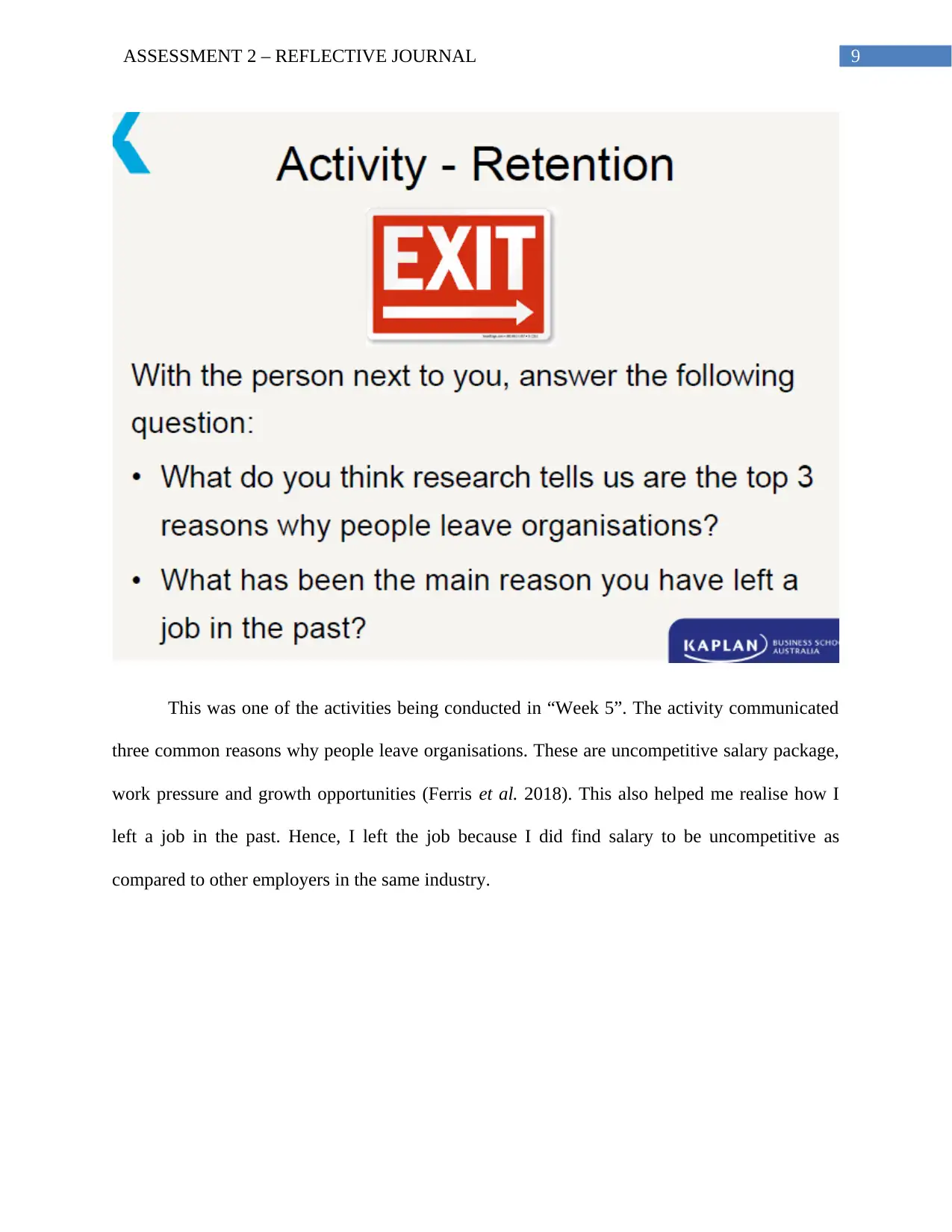
9ASSESSMENT 2 – REFLECTIVE JOURNAL
This was one of the activities being conducted in “Week 5”. The activity communicated
three common reasons why people leave organisations. These are uncompetitive salary package,
work pressure and growth opportunities (Ferris et al. 2018). This also helped me realise how I
left a job in the past. Hence, I left the job because I did find salary to be uncompetitive as
compared to other employers in the same industry.
This was one of the activities being conducted in “Week 5”. The activity communicated
three common reasons why people leave organisations. These are uncompetitive salary package,
work pressure and growth opportunities (Ferris et al. 2018). This also helped me realise how I
left a job in the past. Hence, I left the job because I did find salary to be uncompetitive as
compared to other employers in the same industry.
Paraphrase This Document
Need a fresh take? Get an instant paraphrase of this document with our AI Paraphraser
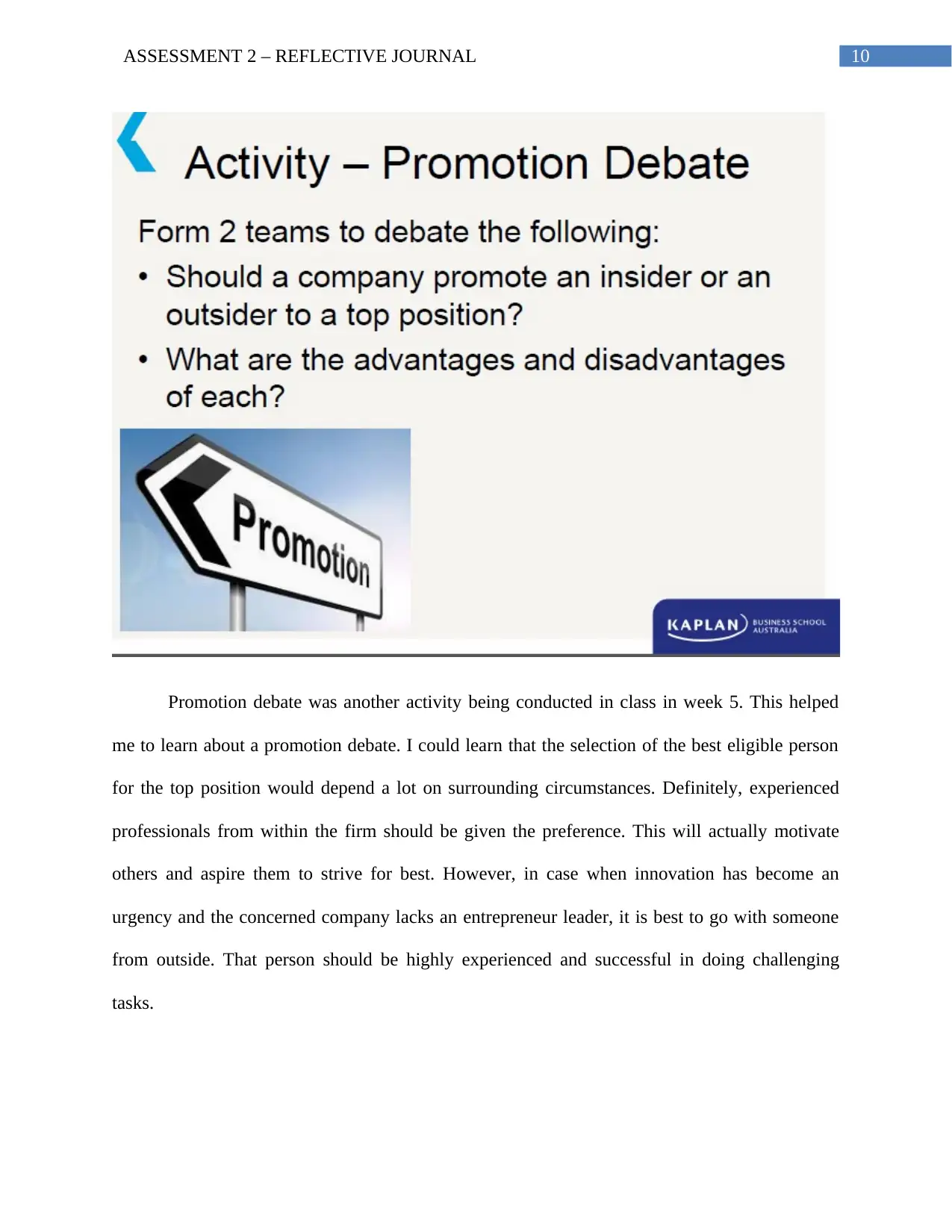
10ASSESSMENT 2 – REFLECTIVE JOURNAL
Promotion debate was another activity being conducted in class in week 5. This helped
me to learn about a promotion debate. I could learn that the selection of the best eligible person
for the top position would depend a lot on surrounding circumstances. Definitely, experienced
professionals from within the firm should be given the preference. This will actually motivate
others and aspire them to strive for best. However, in case when innovation has become an
urgency and the concerned company lacks an entrepreneur leader, it is best to go with someone
from outside. That person should be highly experienced and successful in doing challenging
tasks.
Promotion debate was another activity being conducted in class in week 5. This helped
me to learn about a promotion debate. I could learn that the selection of the best eligible person
for the top position would depend a lot on surrounding circumstances. Definitely, experienced
professionals from within the firm should be given the preference. This will actually motivate
others and aspire them to strive for best. However, in case when innovation has become an
urgency and the concerned company lacks an entrepreneur leader, it is best to go with someone
from outside. That person should be highly experienced and successful in doing challenging
tasks.
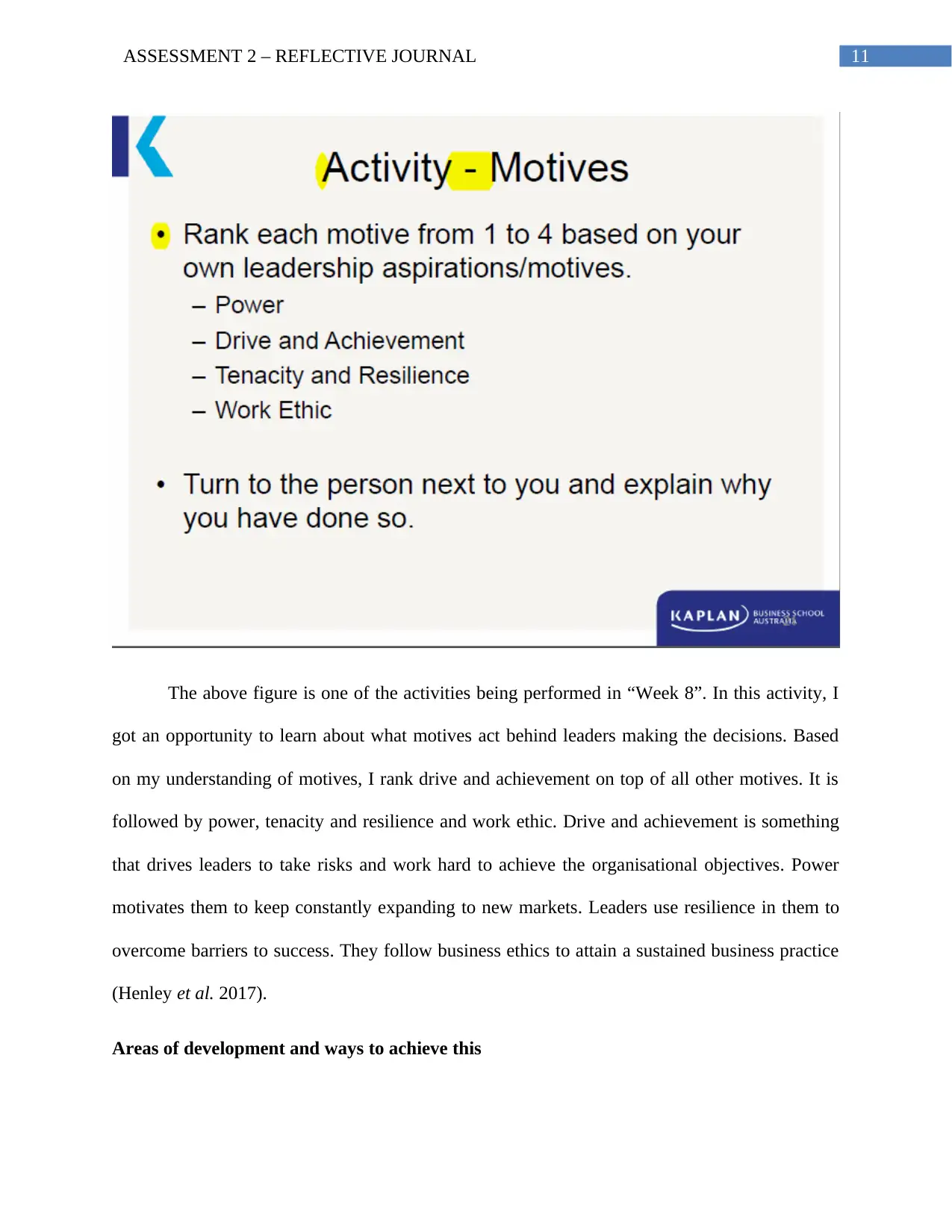
11ASSESSMENT 2 – REFLECTIVE JOURNAL
The above figure is one of the activities being performed in “Week 8”. In this activity, I
got an opportunity to learn about what motives act behind leaders making the decisions. Based
on my understanding of motives, I rank drive and achievement on top of all other motives. It is
followed by power, tenacity and resilience and work ethic. Drive and achievement is something
that drives leaders to take risks and work hard to achieve the organisational objectives. Power
motivates them to keep constantly expanding to new markets. Leaders use resilience in them to
overcome barriers to success. They follow business ethics to attain a sustained business practice
(Henley et al. 2017).
Areas of development and ways to achieve this
The above figure is one of the activities being performed in “Week 8”. In this activity, I
got an opportunity to learn about what motives act behind leaders making the decisions. Based
on my understanding of motives, I rank drive and achievement on top of all other motives. It is
followed by power, tenacity and resilience and work ethic. Drive and achievement is something
that drives leaders to take risks and work hard to achieve the organisational objectives. Power
motivates them to keep constantly expanding to new markets. Leaders use resilience in them to
overcome barriers to success. They follow business ethics to attain a sustained business practice
(Henley et al. 2017).
Areas of development and ways to achieve this
⊘ This is a preview!⊘
Do you want full access?
Subscribe today to unlock all pages.

Trusted by 1+ million students worldwide
1 out of 15
Related Documents
Your All-in-One AI-Powered Toolkit for Academic Success.
+13062052269
info@desklib.com
Available 24*7 on WhatsApp / Email
![[object Object]](/_next/static/media/star-bottom.7253800d.svg)
Unlock your academic potential
Copyright © 2020–2026 A2Z Services. All Rights Reserved. Developed and managed by ZUCOL.




